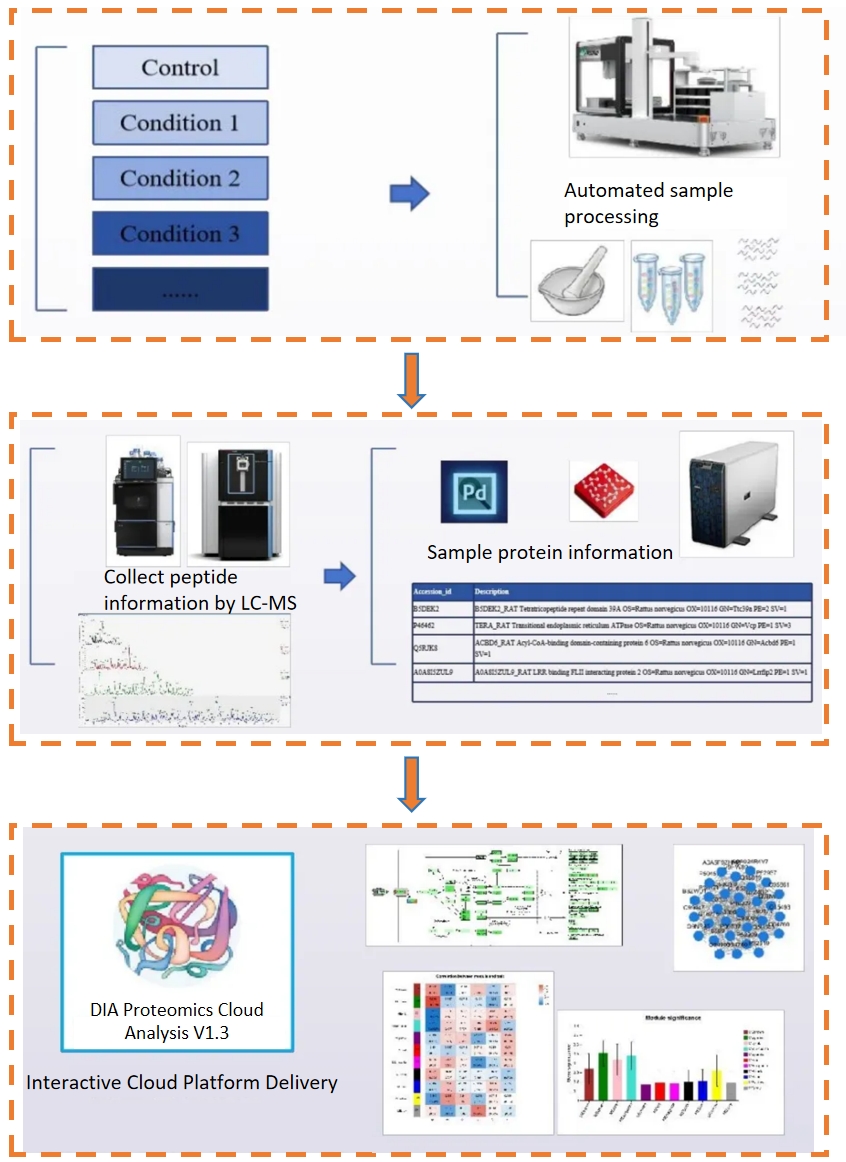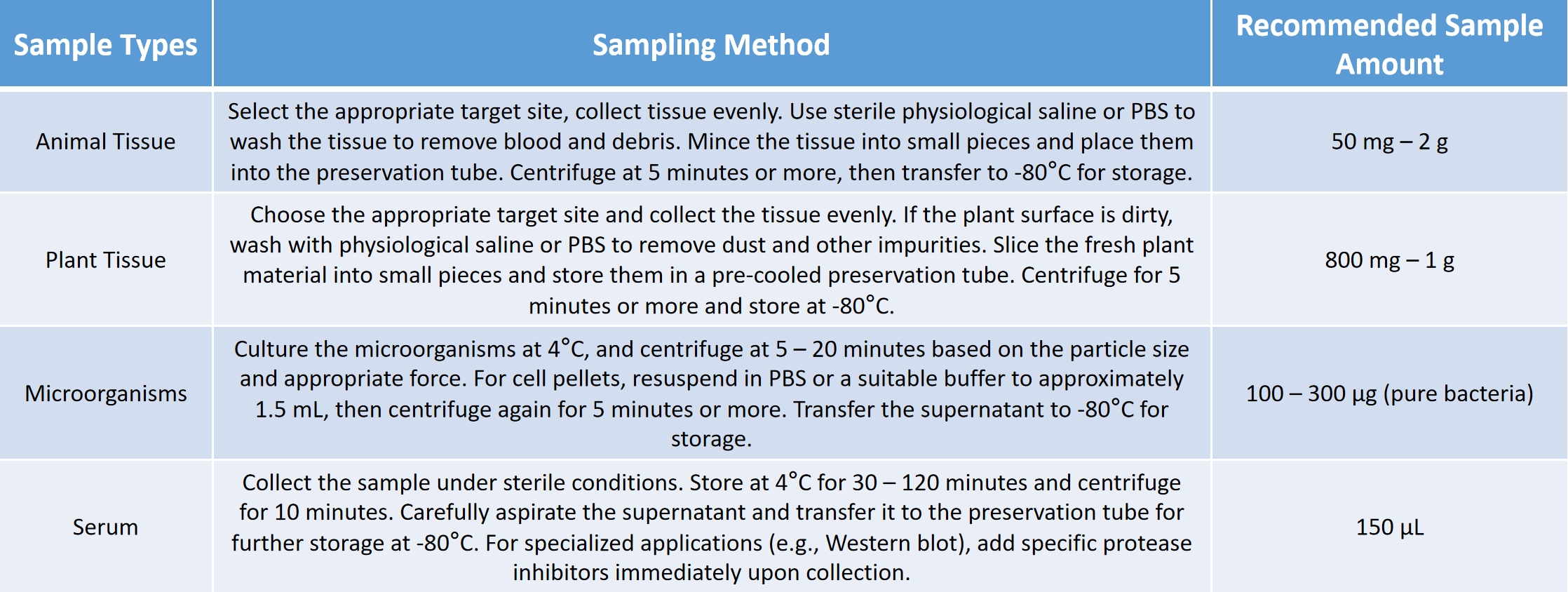Agricultural Large Sample Proteomics Solution
-
Automated Sample Processing: We ensure that the biological samples from various conditions (e.g., different treatments or control groups) are efficiently processed with automated systems. This step includes protein extraction, quantification, and normalization, ensuring high throughput and consistency.
-
LC-MS Data Acquisition: Using the Orbitrap Astral mass spectrometer coupled with the Neo UHPLC system, we achieve ultra-high resolution with acquisition speeds reaching 200 Hz, allowing for precise peptide separation and detection. This significantly enhances the quality and depth of proteomic data collected from agricultural samples.
-
Protein Data Analysis: The processed data is analyzed using powerful cloud-based software platforms with high-speed servers, ensuring efficient and accurate interpretation of complex protein datasets. This stage provides detailed information on protein identification, quantification, and functional annotation.
-
DIA Cloud Platform: Our solution incorporates the latest DIA (Data Independent Acquisition) proteomics cloud analysis platform, offering more than 50 analysis tools for comprehensive protein analysis. This platform allows for in-depth data mining, pathway enrichment analysis, and comparative studies, leading to actionable insights in agricultural research.
In proteomics studies, sample size plays a crucial role. Large sample sizes enable more reliable and statistically significant results, reducing biological variability and potential biases. A small sample size might miss critical biological insights, leading to inaccurate conclusions. Large-scale sample proteomics research ensures thorough evaluation of experimental variables, thereby providing a deeper understanding of complex biological systems. For agricultural research, this approach is particularly important as it allows the study of large populations and diverse conditions, contributing to crop improvement and disease resistance. Advanced statistical techniques, such as LASSO regression, Cox regression, and multivariate analysis, are frequently applied to derive valuable insights from large sample data sets.
Agricultural Large Sample Proteomics Solution
MtoZ Biolabs offers a comprehensive solution for agricultural large sample proteomics analysis, utilizing cutting-edge Orbitrap Astral mass spectrometry technology. This approach involves several key stages:

Project Implementation Suggestions
To ensure the successful execution of the agricultural proteomics project, we recommend optimizing the design based on the following aspects:
✅ Experimental Design
The significance of a statistically robust experimental design cannot be overstated. The design should include appropriate control groups to ensure comparability between samples, particularly in large-scale studies where different biological states and environmental conditions must be accounted for to capture a comprehensive biological response. Additionally, the design should consider the timing of sample collection, processing methods, experimental conditions, and data acquisition to minimize biological variability.
✅ Quality Control
Strict quality control measures should be enforced throughout the project—from sample collection and processing to data acquisition. By repeating experiments and adhering to consistent standard operating procedures, experimental deviations can be minimized, ensuring the reliability of the results. Quality control measures should also include regular calibration of equipment, the use of known standards, and the assessment of data quality, especially for mass spectrometry data, to maintain high sensitivity and resolution.
✅ Sample Processing and Storage
Samples should be processed and stored under strictly controlled conditions to prevent degradation or contamination, especially crucial in large-scale projects to maintain sample consistency. We recommend the use of automated high-throughput processing platforms during sample handling to ensure uniform treatment conditions for each sample and reduce human error. Samples should be stored following low-temperature freezing principles, with periodic integrity checks based on experimental requirements.
✅ Data Collection and Analysis
For data collection, the use of advanced mass spectrometers, such as the Orbitrap Astral, is advised to ensure efficient and accurate detection of protein information. During the data analysis phase, extensive use of the DIA proteomics cloud platform for in-depth data mining and bioinformatics analysis is recommended. The analysis should employ various statistical tools and machine learning algorithms to extract valuable biological insights from complex proteomics datasets.
✅ Statistical Analysis and Result Validation
Large dataset analysis requires sophisticated statistical methods, such as LASSO regression, Cox regression, and multivariate analysis, to ensure that data interpretation is statistically significant. Furthermore, research findings should be validated biologically, using methods like Western Blot and ELISA to confirm key proteins, further ensuring the reliability of discoveries.
Sample Delivery Guidelines
To ensure the successful completion of your agricultural large sample proteomics project, we recommend the following for sample delivery:

MtoZ Biolabs is dedicated to providing state-of-the-art proteomics solutions tailored to large-scale agricultural research projects. Our advanced mass spectrometry technologies and comprehensive analysis platforms ensure that your project results in actionable insights, ultimately contributing to advancements in agricultural science.
How to order?







